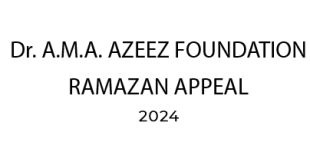By Jezima Ismail
A voice calls out the Adhan – the call for prayers – sometimes melodious, at other times just the reverse. The call is always welcomed. It ushers in important times in our prayer. During Ramadan it is no secret that most adherents wait for the evening call. It is the breaking fast time, iftar as it is known in Arabic.
I was amused to read recently an article about the “All you can eat Buffet Iftar” available in hotels. Iftar has assumed quite some prominence in the fasting season as hotels and eating houses spare no effort to create the exotic gourmet dishes that attract numbers. Due to the publicity given to these, the main purpose of Ramadan gets slightly dimmed, but what worries me is if it will get completely eliminated. What I am talking about is the glorious opportunity given to Muslims to grow and deepen our spirituality, to consider it a veritable workshop of 30 days to enhance contemplation and increase self-purification.
Imam Faisal Abdul Rauf refers to Ramadan as an ‘enclosure in time’ just like a mosque, church, or temple is an enclosure in space. The respect we accord a house of worship is to be granted to Ramadan. We are fortunate indeed to have this opportunity to reflect, contemplate and draw ourselves away from the turbulence of life into a realm where it’s possible to contemplate. Fasting is not only to deny oneself food and water.Abstaining from all evil actions is a sine-qua-non of fulfilment of the objective of fasting. The Prophet once said that the silence of a fasting person is the glorification of God, that is even his sleep is counted as worship. The sole aim of fasting is to raise God’s consciousness or Taqwa.
The process for a Muslim as enunciated by the Prophet (peace and blessings be upon him) is that we very simply go from Islam – right action to Iman (right knowledge) and ihsan (right virtue). Islam connotes the submission to Allah set out in a series of ritual actions. Iman or faith refers to right beliefs about God that is seeking God’s truth with your mind. Ihsan is to grow a consciousness which is loving Allah above everything else and opens oneself to union with Allah. Ramadan provides the time to evolve from one stage to the other; from an external observation of religiosity one goes to an inner expression of faith to a state of intimacy with Allah. It is here that we nurture our faith and during this precious time awarded to us at Ramadan we strive at perfection of faith and not scholarship or a storing of erudite knowledge. We often come across those in their homilies and even in ordinary conversations airing their Arabic and scholarly terms they have imbibed during their sojourn with books. However, these hardly impact on the ordinary man who in fact tends to turn away from such ‘showcasing’.
During this Ramadan one of the books I am reading is ‘Islam – A search for meaning’ by Imam Faisal Abdul Rauf. Some of the thoughts expressed here have had their origins in this reading. A theoretical knowledge of Islam, for example – its articles and principles or the difference between right and wrong, is not difficult to understand but a ‘personally assimilated and practised understanding’ is not easy to achieve. In fact, the holy month of Ramadan grants us this opportunity to experience God. This is the spiritual way to understand Islam and on this foundation develop a personal relationship with Allah where one goes beyond the intellect to the soul.
Those who do not understand the spiritual depth of Islam are in awe of the attitude of the Muslim to Ramadan, that is the fervour and the expectation with which the month is awaited. “Thirty whole days of abstinence, from dawn to dusk – How can you?” people ask. The answer is, “It is obligatory in Islam.”
Question: Don’t you ever want to break the rule?
Answer: No principle of Islam, which is a part of the divine revelation, can be broken – It is an Islamic reality. In summary, the faith or Iman of the Muslim is so steadfast that to him Ramadan comes as a blessing and not a burden.
‘Amal’, or good action, is a manifestation in reality of the Muslim’s total submission to Allah. Any action needs a code of rules according to which our individual or collective behaviour is organized. The base of this organization is the divine revelations embodied in the Qur’an which is manifested in the world through the actions and words of the holy Prophet (peace and blessings be upon him). The central pillar of support is Iman or faith which all Muslims subscribe to every moment of their day. The adhan or call to prayer that ensues from the minaret five times a day voices the essence of this faith. The theme is “God is the Greatest. There is no God but Allah and the Holy Prophet (peace and blessings be upon him) is the Messenger of Allah.”
The four other pillars are Prayer (salah), Fasting (sawm), Charity (zakahA tax that is the duty and social obligation of every Muslim. This as the fourth Pillar of Islam More) and Pilgrimage (hajj) which act as support to the central pillar of Faith.
What Prayer (salah) seeks to establish in a Muslim five times a day, fasting in the month of Ramadan makes firmer once a year. This fasting is complete abstinence from the things of material nature so that man who has both Godly and animal-like attributes could override the latter and establish a balance that would make him a fit representative of Allah. As a writer very simply phrases it, “The Muslim empties his stomach of all the material things, to fill his soul with peace and blessings, to fill his heart with love and sympathy, to fill his spirit with piety and faith, to fill his mind with wisdom and resolution.” The discipline exercised during this month brings all of the ummah (the Muslims) face to face with the realities of life and guides us to fashion our life to act in the true concept of Tawhid which is true subservience to Allah’s will.
The commentary on the relevant passages in the Holy Qur’an on Ramadan by Yusuf Ali will clarify the aspect of fasting in Ramadan. The Muslim fast has certain distinguishing features which places it in a separate category to other fasts but as in other faiths the principle of self-denial by fasting is the common base. It is an accepted fact that “the instincts for food, drink and sex are strong in the animal nature and temporary restraint from all these enables the attention of man to be directed to higher things”. Through prayer, contemplation, and acts of charity man focuses his attention on the spiritual and moral. It is in short a journey towards the Divine, and fasting forms the road to it. This fact must be remembered; fasting is just the design for the framework. The content within the framework has to be worked on; otherwise the whole blessed event becomes an almost empty exercise devoid of all spirituality.
Once the meaning is clear, the influence of it spreads out to the other eleven months of the year. Ramadan is calculated according to the lunar calendar and it falls in different months. The purpose of this is for man to discipline himself under various circumstances. Cold winds may blow, the rays of the sun may dry even the biggest rivers, the rain may lash, flowers may bloom making the whole country a picture of life and beauty, but to a Muslim Ramadan is Ramadan, the holy month to be focused on, regarded and respected for the opportunities it provides for a better and righteous life. Fasting clearly outlines the role of a Muslim and makes a Muslim understand his function. His duty as Allah’s vice-regent is fulfilled not only when he learns to live in peace with himself but he must manifest this inner peace by service to humanity and with the thought that what he does in this world affects the ‘life hereafter’. The basic belief of the Unity of God reaches out to the Unity of Man and during fasting prepares every Muslim to work out his programme of righteous work or ‘Amal-i-Salih’.
During Ramadan, the spirit of social belonging as well as the Unity of Brotherhood and Equality based on the concept of Tawheed or Oneness of Allah pervades the whole Muslim ummah. It is as some describe it to be a “Godly prescription for self-assurance and self-control for the maintenance of human dignity and freedom.
This is a very necessary one today because man’s dilemma is not the adverse events that beset the world but the fact that man is functioning badly. His potential and his positive qualities seem to be floundering, and what is needed is a super force to bring to the surface attitudes that would restore him to the dignity that should rightfully be his if he calls himself the vice-regent of Allah. “For God created him in His own image telling him, “If you seek Me, take your own self as an indication.”
Fasting during Ramadan is the framework for reflection on man’s role on Earth. Having accepted the heavy trust of Allah he sees his perfection in the creation of a private relationship with Allah which extends outwardly to embrace mankind.
Source : http://www.sundaytimes.lk
 Sri lanka Muslims Web Portal Diversity and Inclusiveness
Sri lanka Muslims Web Portal Diversity and Inclusiveness



